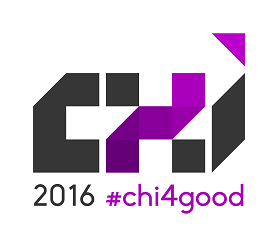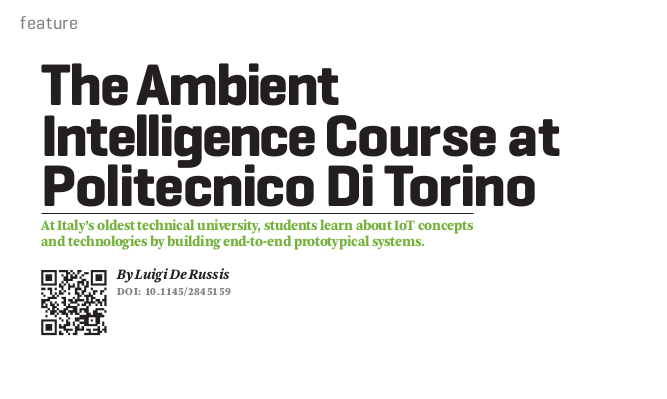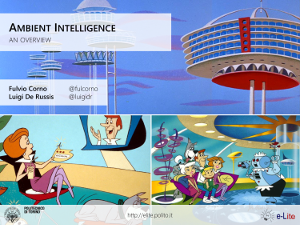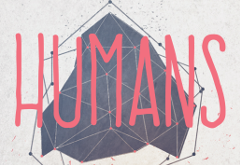- Details
The e-Lite research group will participate to the ACM Conference on Human Factors in Computing Systems (CHI), one of the most important conference in the field of human-computer interaction. The 2016 edition will take place in San Jose, California, USA, from the 7th to the 12th of May.
Luigi De Russis will present a late-breaking work on Monday and Tusday (May 9-10) about an evaluation of alternative GNomon widgets. The work, entitled Clocks, Bars and Balls: Design and Evaluation of Alternative GNomon Widgets for Children with Disabilities, is in the Accessible Game domain and builds upon our previous effort in GNomon, a framework for creating dynamic one-switch video games.
The paper proposes a parallel between three different widgets specifically designed for GNomon-based interfaces and aimed at children with physical impairments that also have cognitive disabilities. Each widget employs metaphor in a different way and it has been evaluated with six children with motor and cognitive disabilities. The results are encouraging: a widget, based on the "big and small" concept, is preferred by children and, therefore, is a candidate to make single-switch games easier to approach.
- Details
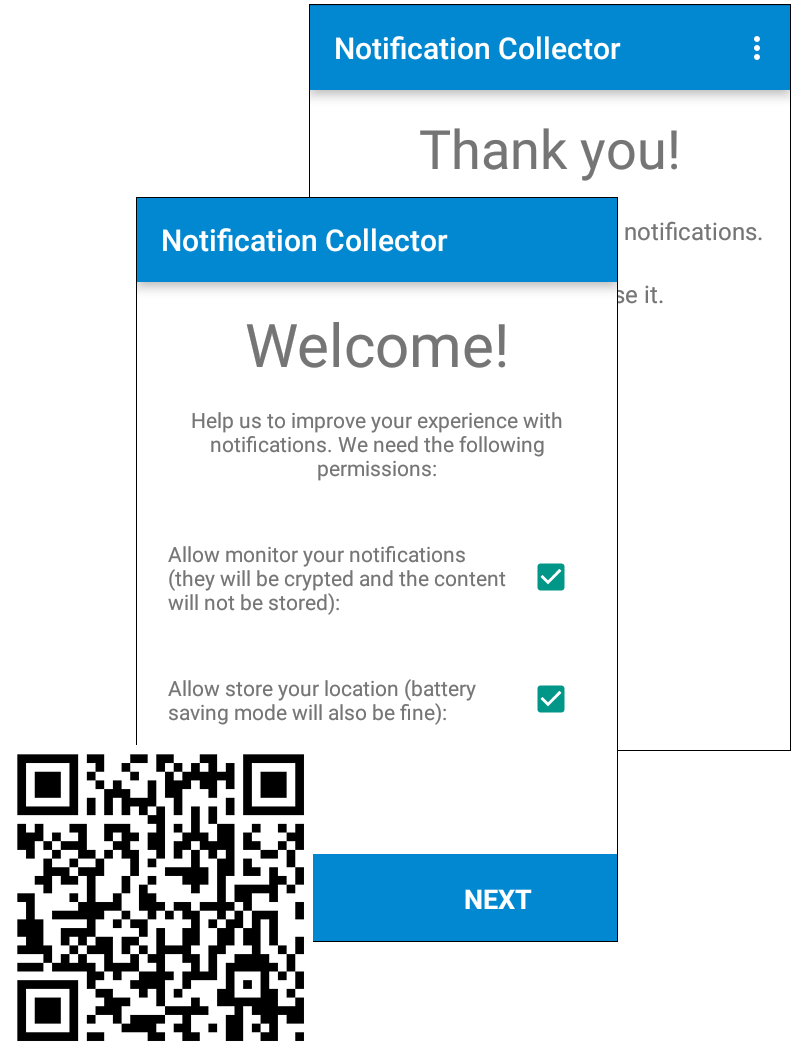 In an increasingly connected world in which almost every person owns a smartphone, everyone receives a lot of notifications every day, but not all of them are really interesting. Our research aims at identifying the reasons for this different interest in notifications and specifically in studying any relationship between the usefulness of a notification and the context in which it is received (user location, time and current user activity).
In an increasingly connected world in which almost every person owns a smartphone, everyone receives a lot of notifications every day, but not all of them are really interesting. Our research aims at identifying the reasons for this different interest in notifications and specifically in studying any relationship between the usefulness of a notification and the context in which it is received (user location, time and current user activity).
Aiming at analysing such a correlation, we developed an Android application able to collect the following anonymous statistical information:
- Context information: location, Wifi connectivity, physical activity;
- Notification details: arrival time, sender app name (e.g., Whatsapp, Hangout, ...), sender unique identifier (encrypted version of Android notification title), location of the device;
- Other details: phone status (active or inactive), ringer mode (silent, vibrate, sound), battery status.
We don't read nor store any notification content!
Help us with our research: download and install the free Notification Collector app by clicking on the following link.
Developed by the e-Lite Research Group at Politecnico di Torino in collaboration with TIM SWARM Joint Open Lab.
If you have any feedback or if you want to report any problem, please don't hesitate to contact us at: teodoro.montanaro [at] polito.it
ITALIAN VERSION
In un mondo sempre più connesso in cui quasi ogni persona possiede uno smartphone, ognuno di noi riceve ogni giorno moltissime notifiche, ma solo alcune di esse sono realmente interessanti. La nostra ricerca punta ad identificare le ragioni di questa differenza di interesse nelle notifiche ed in particolare all'identificazione della relazione esistente tra l'utilità di una notifica e il contesto in cui è ricevuta (dove si trova l'utente, che ora è e qual è l'attuale attività dell'utente).
Con l'obiettivo di analizzare questa correlazione, è stata sviluppata un'applicazione per dispositivi Android che permette di raccogliere i seguenti dati statistici e anonimi:
- Informazioni di contesto: localizzazione, connettività wi-fi, attività;
- Dettagli relativi alle notifiche: ora di arrivo, nome dell'app che ha generato la notifica (e.g., Whatsapp, Hangout, ...), identificatore univoco del mittente (versione criptata del titolo della notifica Android), localizzazione del dispositivo;
- Altri dettagli: stato dello smartphone (acceso o spento), modalità suoneria (silenzioso, vibrazione, suono), stato della batteria.
Non leggiamo e non salviamo in alcun modo il contenuto della notifica.
Aiuta la nostra ricerca: scarica l'app gratuita Notification Collector cliccando sul link seguente.
Progetto sviluppato da e-Lite Research Group presso il Politecnico di Torino in collaborazione con il TIM SWARM Joint Open Lab.
Se hai qualsiasi suggerimento e/o vuoi segnalare un problema non esitare a contattarci all'indirizzo teodoro.montanaro [at] polito.it
- Details
In our research, we are exploring the future of user interaction between user and smart environments, in particular smart homes. We are now conducting an on-line survey to update, and compare, the research findings of a 5-years old study. In 2010, hundreds of users responded to a survey, and unveiled a profound mismatch between user expectations and industry offerings.
Help us to check whether the last 5 years have reduced this gap, and give us your vision about the smart home you would love.
Complete the short survey (5 minutes) in your native language at: http://bit.ly/smarthomesurvey2016 (available in English, Italian, French, German, Spanish, Portuguese)
Nella nostra attività di ricerca, stiamo esplorando il futuro dell'interazione utente tra gli abitanti e gli ambienti intelligenti, in particolare case intelligenti. Abbiamo lanciato un sondaggio on-line per aggiornare e confrontare i risultati di uno studio che risale a 5 anni fa. Le centinaia di utenti che hanno risposto ad un sondaggio nel 2010 hanno evidenziato un profondo divario tra le aspettative degli utenti e le soluzioni offerte dall'industria.
Aiutaci a verificare se in questi 5 anni il divario si sia ridotto, e condividi la tua visione sulla casa intelligente che ameresti.
Completa il sondaggio (5 minuti) a: http://bit.ly/smarthomesurvey2016 (disponibile in inglese, italiano, francese, tedesco, spagnolo, portoghese)
- Details
The ACM XRDS (Crossroads) magazine dedicated its Winter 2015 issue to the Internet of Things (IoT). The editors invited us to write an article about our experience in the Ambient Intelligence course, an elective course open to all the 3rd years students at Politecnico di Torino. During the course, in fact, students learn how to build Ambient Intelligence systems by exploiting contemporary IoT devices and services, with a focus on the end users of their prototypical creations.
The paper "The Ambient Intelligence Course at Politecnico di Torino" provides a brief overview of the course content and methodologies, as well as showcases some of the projects designed and realized by the students during the 2015 edition of the course.
- Details
Durante il seminario Experiences toward the metadesign dimension (che, come annunciato, si è tenuto il 08/01/2015), l'intervento di Fulvio Corno ha ripercorso le caratteristiche principali del tema dell'Ambient Intelligence, in particolare con riferimento alle implicazioni nel campo del Design e della User Interaction, accennando sia ai temi di ricerca, che alle iniziative didattiche in questo campo.
Per saperne di più, sono disponibili i lucidi dell'intervento e lo screencast della presentazione.
- Details
Human Factors. Ambient Intelligence. Smart Materials. Virtual Factory. Sensory Design. Interaction Design. Sono alcuni dei temi che gravitano intorno al vasto tema dello Human Centered Design e che saranno trattati in un seminario presso il Politecnico di Torino (campus di Mirafiori) nella mattinata di venerdì 08/01/2016 (ore 9:00-13:00, aula 12AM). Ospite d'onore sarà il prof. Joseph Giacomin, della Brunel University London.


